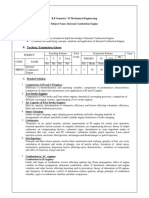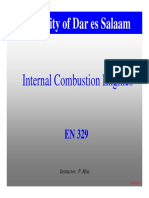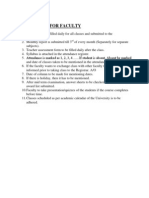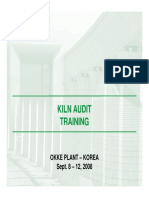0 ratings0% found this document useful (0 votes)
6 viewsICE course information-_Copy1
ICE course information-_Copy1
Uploaded by
Nora Kyi SheinCopyright:
© All Rights Reserved
Available Formats
Download as DOCX, PDF, TXT or read online from Scribd
ICE course information-_Copy1
ICE course information-_Copy1
Uploaded by
Nora Kyi Shein0 ratings0% found this document useful (0 votes)
6 views3 pagesCopyright
© © All Rights Reserved
Available Formats
DOCX, PDF, TXT or read online from Scribd
Share this document
Did you find this document useful?
Is this content inappropriate?
Copyright:
© All Rights Reserved
Available Formats
Download as DOCX, PDF, TXT or read online from Scribd
Download as docx, pdf, or txt
0 ratings0% found this document useful (0 votes)
6 views3 pagesICE course information-_Copy1
ICE course information-_Copy1
Uploaded by
Nora Kyi SheinCopyright:
© All Rights Reserved
Available Formats
Download as DOCX, PDF, TXT or read online from Scribd
Download as docx, pdf, or txt
You are on page 1of 3
Technological University (Maubin)
Department of Mechanical Engineering
Course Information for Internal Combustion Engines
1. Title of Subject Internal Combustion Engines
2. Subject Code ME – 51023 & ME - 52023
3. Credit Hour 2&2
4. Pre-requisite ME-21013, ME-22013, ME-31013,ME32013 –
Thermodynamics
5.Aim of Subject To provide adequate knowledge for the students to the concepts
thermodynamic principle applied in internal combustion engines
and its components
6. Learning Outcomes LO(1) Ability to understand the ignition system of SI engine,
of Subject
injection system of CI engine components and how do they work,
LO(2) Ability to understand the stages of combustion in SI and
CI engine and phenomenon of detonation of SI engine and knock
characteristic of CI engine and affect of engine variable on it,
LO(3) Ability to understand lubrication and cooling system of
Internal Combustion Engine,
LO(4) Ability to apply thermodynamic principle on calculation
of supercharger and turbocharger especially on isentropic
efficiency of turbine and compressor
LO(5) Ability to understand operation principle of two stroke
engine and advantages and disadvantages of two stroke engine
Lab Experiment Work in a group
7. Assessment Scheme Report Writing 10%
Practical assessment at the
end of the lab
Tutorial To Enhance the 20%
understanding of basic
concept in lectures
Mid-Term Exam Written Exam 35%
Final Exam Written Exam 35%
Topics Hours
Fundamental of Internal Combustion Engine
•Introduction, Principles of SI and CI engine
operation, 2-stroke engines, 4-stroke engines 3
•Basic engine Performance and Road Load 3
Performance
8. Detail of Subject
• understand the performance parameters in
evaluation of IC engine
performance,
• calculate the speed of IC engine, fuel consumption,
air consumption, etc.,
• evaluate the exhaust smoke and exhaust emission,
and
Differentiate between the performance of SI engine
and CI engines.
Ideal standard cycles, thermal efficiencies,
comparison, deviations ,
2
Otto Cycle, Diesel Cycle, Dual Cycle
Compression Chart, Combustion Chart, Lean
Mixture, Rich Mixture, Correct Mixture, Calculation
of Otto Cycle, Diesel Cycle, Dual Cycle by using
4
Chart
Fuel Air Cycles Analysis ,Time Losses, Losses due to
imperfect mixing of the charge, Exhaust blowdown 3
lossess, Direct heat loss due to cylinder walls
Actual Cycles and Their Analysis The nature of fuel
air ratio: very rich or very lean 3
:The ignition advanced is not optimum.
Characteristics of engine fuels, knock resistance,
2
ignition tendancy, ccombustion chemistry (air excess
ratio, calorific value, adiabatic flame temperature,
dissociation)
Carburator fundamentals, fuel injection, control of
A/F ratio: Float system, Ideal system, Main metering
system.Power system, Acceleration pump system,
4
Choke system
•Electronic Fuel Injection, electronic control module,
sensor, actuators, electronic fuel injection system,
comparison between EFI and Carburettors,
Read-only memory (ROM) 6
Random-access memory (RAM)
Keep-alive memory (KAM).
Review
9. Teaching and This subject will be delivered using the following:
Learning Activities Lecture Hours = 30 hours
Lab/Tutorial Hours = 60 hours
Total Contact Hours = 90 hours
10. Laboratory 1. Four Stroke Petrol Engine
2. Four Stroke Diesel Engine
3. Automotive Trainer
4. Ignition System Trainer
11. Reading Material Textbook Internal Combustion Engine Text Book
Reference Fundamental of Internal Combustion Engine,
Material Prentice Hill, New Jersey, Willard W, Pulkrabek
You might also like
- w110 and Other Models Service ManualDocument88 pagesw110 and Other Models Service ManualinfoNo ratings yet
- LPG Feasibility ReportDocument32 pagesLPG Feasibility Reportujjowal82% (17)
- Company Profile PDFDocument4 pagesCompany Profile PDFYayan Fadlanza100% (1)
- Pre-Inspection Check List Dump - Truck - H.loader NewDocument4 pagesPre-Inspection Check List Dump - Truck - H.loader NewMuhammadIkhsanMaulana100% (1)
- Automobile Engineering SyllabusDocument6 pagesAutomobile Engineering SyllabusSayad H AbirNo ratings yet
- Pipe Color Code Standard and Piping Color Codes ChartDocument25 pagesPipe Color Code Standard and Piping Color Codes Chartkapal 80m100% (1)
- 140HDocument4 pages140HMarco Olivetto100% (3)
- Course Outline22Document2 pagesCourse Outline22Siraj Mohammed100% (1)
- IC Engine BayyeeDocument2 pagesIC Engine Bayyeebirbirsabetee27100% (1)
- 2ME705-2-Internal Combustion Engine PDFDocument2 pages2ME705-2-Internal Combustion Engine PDFkrishnaNo ratings yet
- AAiT IC Engine and Reciprocating Machines Course Outline PDFDocument3 pagesAAiT IC Engine and Reciprocating Machines Course Outline PDFYoseph MershaNo ratings yet
- Birzeit University - Faculty of Engineering Mechanical Engineering Department Internal Combustion Engines-ME 535 Course OutlineDocument2 pagesBirzeit University - Faculty of Engineering Mechanical Engineering Department Internal Combustion Engines-ME 535 Course OutlineMohammad SandoukaNo ratings yet
- Course Outline IC Engine and Reciprocating MachineDocument2 pagesCourse Outline IC Engine and Reciprocating MachineheonetubeNo ratings yet
- IC Course Guide BookDocument5 pagesIC Course Guide BookAddisu AyeleNo ratings yet
- ME605-N-C Internal Combustion EngineDocument3 pagesME605-N-C Internal Combustion Enginesnehalbhalerao20.booksNo ratings yet
- Course-Combustion-EngineeringDocument1 pageCourse-Combustion-Engineeringmiltonjuario902No ratings yet
- Birla Institute of Technology and Science, Pilani: Pilani Campus AUGS/ AGSR DivisionDocument5 pagesBirla Institute of Technology and Science, Pilani: Pilani Campus AUGS/ AGSR DivisionCHAITANYA KRISHNA CHAUHANNo ratings yet
- Advanced IC Engine Course Outline - 2019Document3 pagesAdvanced IC Engine Course Outline - 2019Kumaran PalaniNo ratings yet
- (BM 101) Internal Combustion Engines & TurbinesDocument43 pages(BM 101) Internal Combustion Engines & TurbinesParesh BobdeNo ratings yet
- SylableDocument3 pagesSylabledebelaNo ratings yet
- ICEDocument5 pagesICEArihant ShijuNo ratings yet
- Ublication 800 1684905238913Document129 pagesUblication 800 1684905238913AnkitNo ratings yet
- ME605 - Internal Combustion Engineering PDFDocument3 pagesME605 - Internal Combustion Engineering PDFRajkumar SinghNo ratings yet
- Lecture_plan_170780006022989292365caf5fccc64dDocument2 pagesLecture_plan_170780006022989292365caf5fccc64dbilaljhon753No ratings yet
- INTRODUCTION With NotesDocument31 pagesINTRODUCTION With NotesAntony YtNo ratings yet
- Government Polytechnic, Nagpur: Course CurriculumDocument8 pagesGovernment Polytechnic, Nagpur: Course CurriculumAyush LolusareNo ratings yet
- AES SyllabusDocument5 pagesAES SyllabusAmarjeet Singh (Assistant Professor- Mechanical Engineer)No ratings yet
- Ice Course PlanDocument8 pagesIce Course PlanmallikarjunbpatilNo ratings yet
- Turbo Machinery SyllabusDocument5 pagesTurbo Machinery Syllabustodankarpratham15No ratings yet
- Content Beyond SyllabusDocument5 pagesContent Beyond SyllabusasdhavaleNo ratings yet
- BE Syllabus of Mumbai Uni5Document10 pagesBE Syllabus of Mumbai Uni5Rajendra B PawarNo ratings yet
- ME604 (ICE>) Lecture NoteDocument125 pagesME604 (ICE>) Lecture NoteKamna Kumar100% (1)
- Ic Engine and Gas TurbineDocument2 pagesIc Engine and Gas TurbineShaik YaseenNo ratings yet
- Institute of Engineering & Technology, Devi Ahilya University, Indore, (M.P.), India. (Scheme Effective From July 2015)Document2 pagesInstitute of Engineering & Technology, Devi Ahilya University, Indore, (M.P.), India. (Scheme Effective From July 2015)Subash AppuNo ratings yet
- Lecture 1 - Introduction To Internal Combustion EnginesDocument29 pagesLecture 1 - Introduction To Internal Combustion EnginesYussuf100% (1)
- Me 232 Thermal Engineering LaboratoryDocument9 pagesMe 232 Thermal Engineering Laboratorym.waseemNo ratings yet
- ME F242 IC EnginesDocument4 pagesME F242 IC EnginesHIMANSHU SHARMANo ratings yet
- Tutorial 10Document10 pagesTutorial 10Outis WongNo ratings yet
- Hints For 4.4Document2 pagesHints For 4.4Malik Junaid100% (1)
- Mechanical Lab 1st Yr Lab Manual-1 - 231120 - 193633Document57 pagesMechanical Lab 1st Yr Lab Manual-1 - 231120 - 193633uckoojoyeeta24No ratings yet
- MCL345 Content Jul-2018Document1 pageMCL345 Content Jul-2018sai vamsiNo ratings yet
- P1icic03 Ic Engines SyllabusDocument8 pagesP1icic03 Ic Engines SyllabusSriramulu JaichandarNo ratings yet
- Gas Turbines and Gas Power PlantDocument2 pagesGas Turbines and Gas Power Plantdineshkbunker08No ratings yet
- Course Outline - SMME - ME-439 Fall 2024Document4 pagesCourse Outline - SMME - ME-439 Fall 2024Taha WadiyatNo ratings yet
- Mechanical Lab 1st Yr Lab ManualDocument58 pagesMechanical Lab 1st Yr Lab Manualpiyush138090No ratings yet
- Ic EngineDocument77 pagesIc EngineAkashNo ratings yet
- 20ME731Document2 pages20ME731Ganesh B BNo ratings yet
- PDFDocument6 pagesPDFJithin kvNo ratings yet
- IC EngineDocument2 pagesIC EnginePrince SethiNo ratings yet
- 4-Fuels and Pollution Control-20at44pDocument9 pages4-Fuels and Pollution Control-20at44pMD HUZAIFA HANDURNo ratings yet
- Course Curriculum: Course Title: Internal Combustion Engine Credit Units: 04 Course Level: UG Course Code: To Be AssignedDocument3 pagesCourse Curriculum: Course Title: Internal Combustion Engine Credit Units: 04 Course Level: UG Course Code: To Be AssignedHtat Myat AungNo ratings yet
- Performance Evaluation of A Single Cylinder Four Stroke Petrol EngineDocument5 pagesPerformance Evaluation of A Single Cylinder Four Stroke Petrol EnginejemtyNo ratings yet
- Birla Institute of Technology and Science-Pilani - Hyderabad CampusDocument2 pagesBirla Institute of Technology and Science-Pilani - Hyderabad Campuskomerajaya7259No ratings yet
- Mechanical Engineering Full Handwritten NotesDocument46 pagesMechanical Engineering Full Handwritten NotescacaNo ratings yet
- IC Engines and Reciprocating Machines COURSE Guide BookDocument6 pagesIC Engines and Reciprocating Machines COURSE Guide BookEphrem AbabiyaNo ratings yet
- Ic Engine Lab Course OutlineDocument1 pageIc Engine Lab Course OutlinedebelaNo ratings yet
- SPE - ME-15104 - UpdatedDocument2 pagesSPE - ME-15104 - UpdatedAyush SrivastavNo ratings yet
- B.E. 8th Sem ELE - III-Adv. IC EngineDocument3 pagesB.E. 8th Sem ELE - III-Adv. IC EngineSantosh AloneNo ratings yet
- Automotive Electrical and Electronic SystemsDocument4 pagesAutomotive Electrical and Electronic SystemsVikram Athreya VNo ratings yet
- Course Outline Thermo II 2024Document2 pagesCourse Outline Thermo II 2024NathiNo ratings yet
- IceDocument3 pagesIceJaniNo ratings yet
- Subject Internal Combustion Engine Semester 5th Trade Mechanical Year 3rdDocument25 pagesSubject Internal Combustion Engine Semester 5th Trade Mechanical Year 3rdKareem VazquezNo ratings yet
- Subject Inroduction 3171923 Lecture-1Document11 pagesSubject Inroduction 3171923 Lecture-1freee9044No ratings yet
- Universidade Estadual de Campinas Faculdade de Engenharia MecânicaDocument62 pagesUniversidade Estadual de Campinas Faculdade de Engenharia MecânicaGabriel AraujoNo ratings yet
- Process System Value and Exergoeconomic Performance of Captive Power PlantsFrom EverandProcess System Value and Exergoeconomic Performance of Captive Power PlantsNo ratings yet
- Naval Diesel Engineering: The Fundamentals of Operation, Performance and EfficiencyFrom EverandNaval Diesel Engineering: The Fundamentals of Operation, Performance and EfficiencyNo ratings yet
- An Introduction To Combustion - Pyronics PDFDocument4 pagesAn Introduction To Combustion - Pyronics PDFJúlio Gabriel Queiroz dos SantosNo ratings yet
- RT300-1 & RT345XL - Parts Manual - Draft10 - 09-14-12Document276 pagesRT300-1 & RT345XL - Parts Manual - Draft10 - 09-14-12Daniel Castillo Peña100% (3)
- 2017716154112bitumen 6070Document1 page2017716154112bitumen 6070lab copriNo ratings yet
- Copia de Codigos WLSDocument12 pagesCopia de Codigos WLSjb6048649No ratings yet
- Gasoline Generator Kge2500x Manual enDocument25 pagesGasoline Generator Kge2500x Manual envvelikov100% (1)
- IME Module 4 (1) - 1Document23 pagesIME Module 4 (1) - 1SILAS OMONIYINo ratings yet
- Turbine Heat Rate and EfficiecyDocument48 pagesTurbine Heat Rate and EfficiecyPralay Raut100% (10)
- Diesel Engine Performance Evaluation and Emission Analysis Using Gmelina Seed Oil BiodieselDocument8 pagesDiesel Engine Performance Evaluation and Emission Analysis Using Gmelina Seed Oil BiodieselInternational Journal of Innovative Science and Research TechnologyNo ratings yet
- TW2000 ManualDocument39 pagesTW2000 Manualdavid6328No ratings yet
- Safety Spare Parts - Spare - Ju4-6 - c130820Document2 pagesSafety Spare Parts - Spare - Ju4-6 - c130820Saeed AlviNo ratings yet
- Autolite Spark Plug InfoDocument1 pageAutolite Spark Plug InfoDanny BenderNo ratings yet
- Improving Coke StrengthDocument30 pagesImproving Coke Strengthasnandy100% (1)
- 2017-04-09 Letter To EPA Re PSD ExtensionDocument34 pages2017-04-09 Letter To EPA Re PSD ExtensionAngel GonzalezNo ratings yet
- Engine Caya Cayb Cayc Repair Manual EngDocument552 pagesEngine Caya Cayb Cayc Repair Manual EngNiko 1No ratings yet
- Boroscope Inspection For Gas TurbinesDocument6 pagesBoroscope Inspection For Gas TurbinesJJ75% (4)
- Recent Trends in Automobile Engineering: by Sukhvinder BhatiaDocument28 pagesRecent Trends in Automobile Engineering: by Sukhvinder BhatiaIyappan AlagappanNo ratings yet
- Motor Perkins 3058 PartesDocument167 pagesMotor Perkins 3058 PartesPorfirioOteroPeralta100% (3)
- Kiln Audit Training IntroductionDocument15 pagesKiln Audit Training IntroductionTamer Fathy100% (1)
- Gas Madrid - Q88 - 24.01.2024Document7 pagesGas Madrid - Q88 - 24.01.2024Elchin AbishovNo ratings yet
- Craftsman 917257720Document60 pagesCraftsman 917257720Bruno PilieciNo ratings yet
- Corporate Brochure MechoSystems MechoShadeDocument4 pagesCorporate Brochure MechoSystems MechoShadesolar controlNo ratings yet
- Vinfast and The Electric Vehicle Market in VietnamDocument6 pagesVinfast and The Electric Vehicle Market in VietnamViệt Vớ VẩnNo ratings yet
- Bilans ÉnergétiquesDocument11 pagesBilans ÉnergétiquesoktopusNo ratings yet
























































































